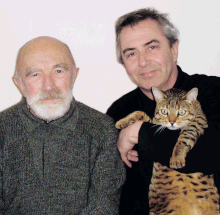Bernard Parmegiani
| Bernard Parmegiani | |
|---|---|

Parmegiani (left) with Christian Zanési
|
|
| Background information | |
| Born |
27 October 1927 Paris, France |
| Died | 21 November 2013 (aged 86) Paris, France |
| Genres | Electronic, acousmatic |
| Occupation(s) | Composer |
| Years active | 1964–2013 |
| Website | www |
Bernard Parmegiani (27 October 1927 − 21 November 2013) was a French composer best known for his electronic or acousmatic music.
Between 1957 and 1961 he studied mime with Jacques Lecoq, a period he later regarded as important to his work as a composer. He joined the Groupe de Recherches Musicales (GRM) in 1959 for a two-year master class, shortly after its founding by Pierre Schaeffer. After leaving his studies with Lecoq, he was first a sound engineer and was later put in charge of the Music/Image unit for French television (ORTF). There he worked in the studio with several notable composers, Iannis Xenakis, for example.
While at ORTF Parmegiani produced music for numerous film directors including Jacques Baratier and Peter Kassovitz, and for A, a 1965 short film animated by Jan Lenica. He also wrote a number of jingles for the French media and the "Indicatif Roissy" that preceded every PA announcement at Terminal 1 of Paris-Charles de Gaulle Airport until 2005.
Parmegiani composed his first major work, Violostries, for violin and tape in 1964 for a choreography performed for Théâtre Contemporain d’Amiens directed by Jacques-Albert Cartier. During a visit to America in the late 1960s, Parmegiani researched the link between music and video and on his return produced several musical videos, including L'Œil écoute, and L’Écran transparent (1973) during a residency at Westdeutscher Rundfunk in Germany. In the 1970s, he also became involved with live performances of jazz and performed with the Third Ear Band in London.
At this time Parmegiani also started writing acousmatic pieces for performance in the concert hall: examples are Capture éphémère of 1967 which deals with the passage of time, and L'Enfer (1972), a collaboration with the composer François Bayle, based on Dante's Divine Comedy.
...
Wikipedia
